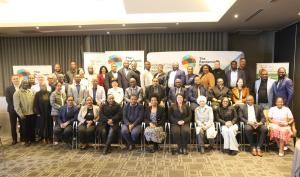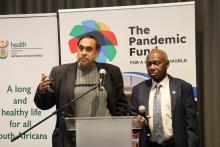South Africa launches Pandemic Fund project to strengthen health emergency preparedness and response
Pretoria – The National Department of Health (NDoH) of the Republic of South Africa, in collaboration with the World Health Organization (WHO), the United Nations Children’s Fund (UNICEF), and the Food and Agriculture Organization (FAO), today officially launched the Pandemic Fund Project at the Protea Fire & Ice, Menlyn in Pretoria, South Africa. This milestone initiative is supported by catalytic funding from the Pandemic Fund and seeks to bolster South Africa’s capacity to prevent, prepare for, and respond to future health emergencies and pandemics. Anchored in a One Health approach, the launch brought together key line ministries including the National Department of Agriculture and the Department of Forestry, Fisheries and the Environment recognizing their critical role in promoting integrated systems that safeguard human, animal, and environmental health.
The Pandemic Fund is a financial intermediary fund hosted by the World Bank to provide catalytic financing that strengthens countries’ capacity for pandemic prevention, preparedness, and response. It brings together a broad coalition of stakeholders, including countries, international organizations, civil society, and foundations under a shared vision of global health security.
Hosted under the theme “Building a Resilient Future: Strengthening Pandemic Prevention Preparedness and Response through a One Health Approach,” the event convened high-level government officials, implementing entities, development partners and technical stakeholders committed to strength ening health systems and intersectoral collaboration.
South Africa received funding under the Pandemic Fund’s Second Call for Proposals ,enabling implementation of two strategic and complementary grants. The first is a single-country grant focused on enhancing pandemic resilience through a One Health approach, integrating human, animal, and environmental health systems. The second is a multi-country grant that aims to strengthen regional disease surveillance and emergency response capacity, particularly in the face of climate-related health threats.
In his opening remarks, Dr Anban Pillay, Deputy Director-General for Health Regulations, Compliance, and Pandemic Prevention Preparedness and Response at the NDoH, emphasized the importance of cross-sectoral partnerships and government leadership in pandemic preparedness to safeguard the future of South Africa.
“Pandemic preparedness requires strong leadership, investment, and collaboration across all sectors of society. This initiative demonstrates South Africa’s commitment to safeguarding the health of our people by building resilient systems that can prevent, detect, and respond to future health emergencies. Through the support of the Pandemic Fund and our partnerships with WHO, UNICEF, and FAO, we are taking decisive steps to protect lives and strengthen our national and regional resilience.”
Representatives from the National Department of Agriculture and the Department of Forestry, Fisheries and the Environment also emphasized the critical role of integrated systems, biodiversity protection, and climate resilience as part of the One Health agenda.
“We as National Department of Agriculture reassure our commitment to collaborate with Department of Health, Department of Forestry and Fisheries, Department of Land Reform and Rural Development and our international participating companies, FAO, WHO and UNICEF. We are committed in building a future resilience by strengthening our pandemic prevention preparedness and response through the one health approach, enhancing human health, animal health and environmental health through multisectoral, multidisciplinary approach.” Dr Khomotso Patrick Matsemela, Deputy Director : Meat Safety Risk Management Directorate
The project is implemented through three coordinated technical workstreams: strengthening surveillance and early warning systems, enhancing laboratory networks and diagnostics, and building a skilled health workforce capable of responding to public health emergencies and pandemics. Each workstream will be led by a relevant implementing entity and supported by national stakeholders.
Speaking on behalf of the implementing entities, WHO, UNICEF, and FAO highlighted their respective technical support roles and commitment to ensuring country ownership and long-term sustainability.
“WHO is proud to support the implementation of the Pandemic Fund initiative through strategic guidance, coordination, and strong partnership. We have already begun working closely with national counterparts to lay the groundwork for stronger disease surveillance, rapid response mechanisms, and a well-equipped, skilled health workforce. This Fund presents a crucial opportunity to move from reactive to proactive approaches, and WHO remains fully committed to helping build a healthier, safer, and more prepared South Africa—contributing to a stronger global health system.” — Ms Shenaaz EL-Halabi, Country Representative of WHO South Africa
“UNICEF is encouraged by the multisector collaboration on this critical initiative, from all present today and those who have supported indirectly as well. Children are particularly vulnerable in emergencies hence our focus is on preparedness, prevention and response to keep children safe and healthy.” — Ms Christine Muhigana, Country Representative of UNICEF South Africa
“FAO reaffirms its commitment to working closely with the lead departments and partners throughout the implementation phase of the Pandemic Fund project. This collaborative effort underscores our dedication to a holistic One Health approach and ensures that institutions are better equipped, resilient, and ready to respond effectively to future pandemic threats.”— Dr Babagana Ahmadu, FAO Representative in South Africa
Executive Head of the Pandemic Fund, Priya Basu shared reflections on the Fund’s mission to catalyze strategic investments in global health security and commended South Africa’s leadership in this domain.
“South Africa’s new project is a timely and strategic investment in strengthening health security through a One Health approach. By enhancing disease surveillance, laboratory systems, and the health workforce, the country is bolstering the foundation for long-term pandemic resilience. The Pandemic Fund is proud to support this effort through catalytic financing: our US$25 million grant has mobilized over US$39 million in additional resources, reflecting strong domestic commitment and international partnerships.” — Ms Priya Basu, Executive Head of the Pandemic Fund
The event also featured a high-level panel discussion, exploring the urgency of pandemic preparedness and the impact of climate, population mobility, and global health threats on national resilience. Panelists included senior experts from NDoH, WHO, FAO, UNICEF, the National Department of Agriculture, and the Department of Forestry, Fisheries and the Environment, each providing insights on the value of collaboration, data sharing, and community-level engagement.
The Pandemic Fund Project represents a critical investment in health system resilience and a shared commitment to protecting lives and livelihoods through evidence-based, multisectoral action.
About the Pandemic Fund
Established in September 2022, at the request of the G20, and formally launched in November under Indonesia’s G20 Presidency, the Pandemic Fund is the first multilateral financing mechanism dedicated to helping low- and middle-income countries bolster their capacity to contain disease outbreaks and prevent pandemics. This Financial Intermediary Fund, hosted at the World Bank, has its own Governing Board.
To date, 28 countries and philanthropies have committed nearly US$3 billion in financial contributions. Since its establishment in 2022, the Pandemic Fund has awarded, through its two funding rounds, grants totaling US$885 million, mobilizing an additional US$6 billion in resources for pandemic prevention, preparedness, and response investments for 75 countries across six geographic regions. A total of 47 projects have received funding to date through the two rounds.
WHO Regional Office for Africa
Email: mroberts [at] who.int (mroberts[at]who[dot]int)
Tel : +211923362401
Email: wamalaj [at] who.int (wamalaj[at]who[dot]int)

